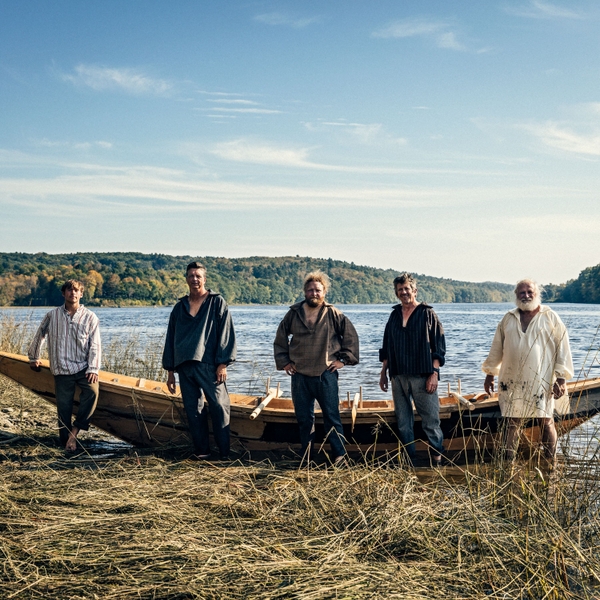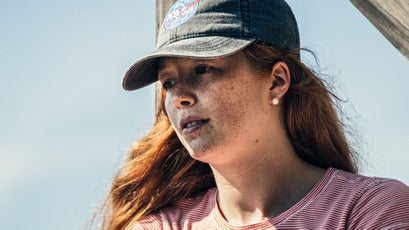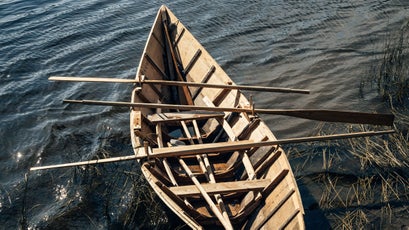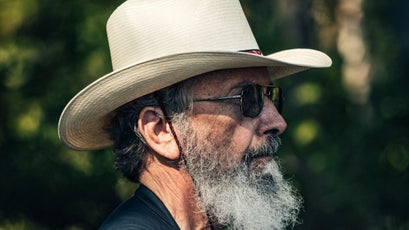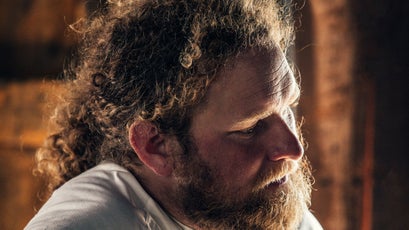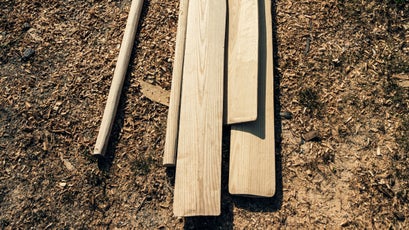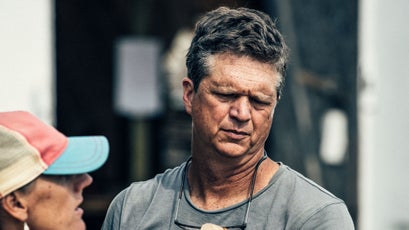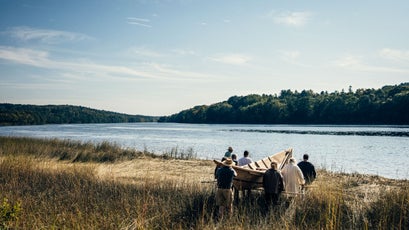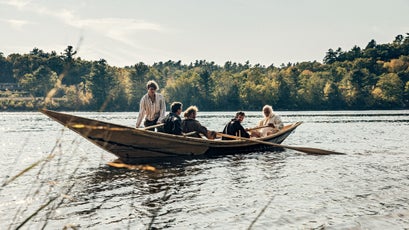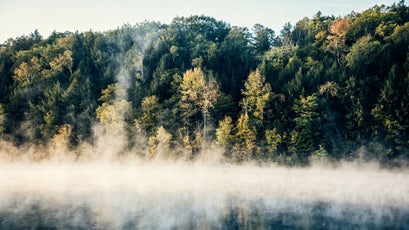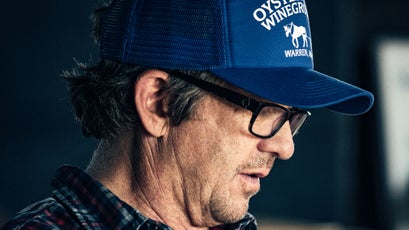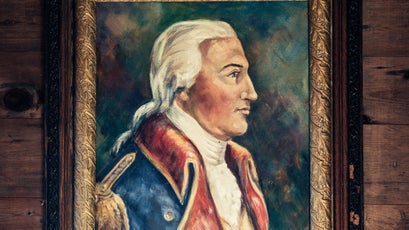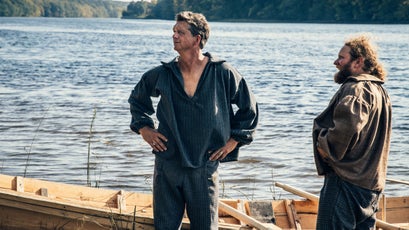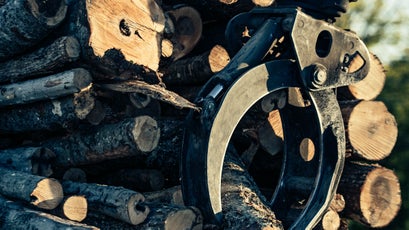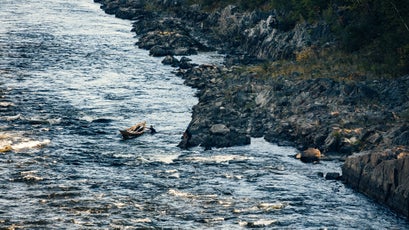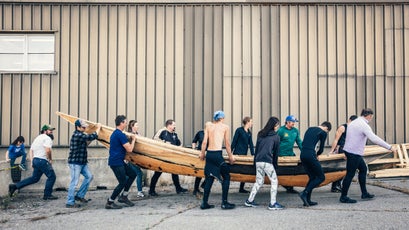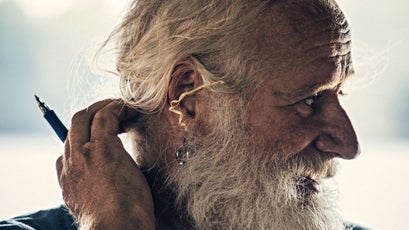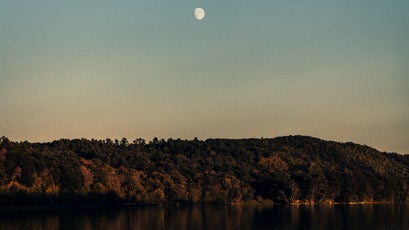Retracing Benedict Arnold’s Foolhardy Upstream Voyage
A glorious and ill-considered expedition to retrace the nearly 300-mile sufferfest endured by colonial badass (and not yet turncoat) Benedict Arnold and his 1,100 brave, starving men. Their aim: to take Quebec City from the British. Ours: to survive.
New perk: Easily find new routes and hidden gems, upcoming running events, and more near you. Your weekly Local Running Newsletter has everything you need to lace up! .
“Say, do any of you have extra underwear?” asked Rob Stevens, looking like a miserable Santa in his sodden red woollens and fluffy white beard, as he inspected our replica 18th-century bateau. His lisp was a bit more pronounced than usual, so I knew he was upset. “They need to be 100 percent cotton.”
The bateau was overturned on the bank of Quebec’s raging Chaudière River—which basically means “boiling cauldron” in French—and Rob, the 62-year-old boatbuilder who’d constructed it, was charged with the emergency repairs. The riverbed had shredded our boat’s bottom like so much Gruyère. Even worse were the see-through gaps where rocks and water had ripped out the caulking.
I peeled off my long wool underwear, tottering a bit on the rocky shore, and slipped out of my green tartan boxers. They were my favorite pair—and apparently the only cotton ones at hand.
“Oh, those are nice,” Rob said admiringly. “Now tear them into long strips. About this wide.” He held his thumb and forefinger about an inch apart.
I readily sacrificed my skivvies because the damage was my fault. The day before, I’d safely guided us down 30 miles of fast-moving water, but late in the afternoon, just as I was beginning to realize that I was tired and couldn’t see all that well, I had failed to slip our 417-pound craft past a pour-over that didn’t end up having enough water pouring over it. I could point out that my bowman, a young filmmaker named Wilder Nicholson, did not have a paddle, because Ben Schott, our resident whitewater expert, who was sitting just inches in front of me in the stern, had grabbed it for himself. But that would be unseemly.
Just as I’d screamed ��ٳ������ٳٳ�!” and swung the stern almost far enough around, Ben helpfully added, “We’re not going to make it!” Indeed, the bottom stuck on that boulder as if it were covered with grippy tape. Our bow swung upstream, and the 22-foot boat filled with angry brown water.
Thankfully, it wasn’t our first swamping—more like our 20th. The four of us somewhat calmly sat there until the weight of the water simultaneously freed us from our captor and submerged the boat. Ben swam off to retrieve a few items that had swirled away in the current, and Wilder and I kicked, stroked, and willed the sunken vessel to shore. It was like trying to eddy out a submerged pickup truck, especially with Rob hanging onto the bateau as if it were a giant PFD.
With another set of boat-destroying rapids just downstream, a narrow eddy was our only hope. Perhaps a bit callously, I yelled at Rob, “Let go, goddammit! You’re dragging us back into the current. Let. Go. Of. The. Boat!” He didn’t.
Later, after we’d made it to shore and I was bent over huffing and puffing, Rob asked, “What the hell were you talking about, let go of the boat? Are you insane? The boat was the only thing keeping me alive! I don’t know, Hodding. I’ve never seen this side of you before. I’m not sure I trust you.”
I’m a fanboy��of Benedict Arnold—yes, that Benedict Arnold, the traitor who makes the folks in today’s Russia investigation look like they were playing tiddlywinks—and it’s all because of his part in the 1775 campaign to take Quebec from the British. Essentially, it was a daring two-pronged attack by the Continental Army to take the fight for American independence to King George’s troops up in Canada. One prong, the supposed main one, led by General Richard Montgomery, would travel the comparatively reasonable route up Lake Champlain and then down the Saint Lawrence River to the fortified ramparts of Quebec City, which sits on a promontory overlooking the river. The other, led by Arnold, a colonel already known for boldness, would take 1,100 men over the seemingly impossible backwoods Native American trade route. If they succeeded, they would arrive in total secrecy.
In late September, Arnold and his men sailed roughly 40 miles up the tidal stretches of Maine’s Kennebec River, where they disembarked at present-day Pittston and switched to 220 wooden bateaux. Hastily built, the 22-foot flat-bottomed boats leaked worse than an old man’s bladder and were prone to capsizing in novice hands (and nearly all the men were novices). Each bateau carried 1,000 pounds of gear, including 45 days of rations. The soldiers would spend the next seven weeks pushing, poling, dragging, and carrying these loads up a 100-mile stretch of the Kennebec, over a 13-mile trail called the Great Carrying Place, then 40 miles up the Dead River, and through a dozen miles of bogs in an area called the Chain of Ponds before crossing the high-elevation mark, the Height of Land, between the Kennebec and Chaudière river basins.
This was all before they headed downstream on the Chaudière, 115 miles of whitewater that empties into the Saint Lawrence near Quebec City. By then the expedition had lost most of the boats and provisions to a hurricane—and hundreds of soldiers to desertion. The rapids of the Chaudière quickly destroyed the remaining boats, and the barefoot, frostbitten, starving soldiers suffered mightily as they stumbled toward Quebec City, arriving on November 14.
Despite this Sisyphean trial, Arnold’s men beat Montgomery’s to Quebec and had to twiddle their thumbs for more than a month outside the city walls. When Montgomery finally arrived and they all attacked on the night of December 31, it was a near instant disaster. Montgomery was killed at the outset, and Arnold was gravely wounded in the leg. The vast majority of the American soldiers were wounded or captured.
While the campaign to sack Quebec was an unmitigated failure, the approach journey is still considered one of the greatest American military expeditions of all time. Arnold’s contemporaries termed him America’s Hannibal (as in elephants over the Alps, not human liver, fava beans, and a nice Chianti). “The guy was a real badass,” says Nathaniel Philbrick, author of . “In the moment of battle, there was no one else quite like him. He was like a comet.”
Last spring, I finally decided that it was Arnold ho! time. I had wanted to retrace the expedition for decades, ever since I’d read Kenneth Roberts’s Arundel, the classic novel about the campaign, published in 1930, in which Arnold comes off as a swashbuckling leader of men and the expedition an oddly appealing trial in pain and misery. I was 54 and had put it off far too long.
I did some quick figuring. Arnold had 1,100 men and 220 boats. Three soldiers manned each boat in the water, while two or three huffed it on shore. I should be fine with one bateau and two friends, with a few more to rotate in when needed. Arnold had taken 51 days; I figured we could do it in 35. I gathered a couple of old lightin’out buddies: John Abbott, 52, the director of outdoor programs at the University of Vermont, and Rob Stevens, 62, who had constructed a replica Viking ship that the three of us sailed from Greenland to Newfoundland in the summers of 1997 and ’98. To lower our median age—Arnold was 34, and most of his soldiers were in their early twenties—we snagged Ben Schott, 36, a Vermont-based whitewater guide who has run the Grand Canyon six times, and Wilder Nicholson, 24, an environmental filmmaker from Maine.
Then we turned to the bateau. Maine loggers were still using the craft well into the 20th century; with its long-stemmed, high-sided bow and stern, it’s the best thing for navigating New England’s rivers with a good-size payload. Yet most Arnold expedition aficionados agree that it was the wrong boat to use: heavy, clumsy, and, in Arnold’s case, too leaky.
Undeterred, we stuck with the bateau because, despite the criticism, it was the river workhorse of its day and the only practical boat Arnold could have used. Indeed, we would prove it was the right craft by being the first fools to get one all the way to Quebec!
By July we had a set of boatbuilding plans, thanks to Maine’s Arnold Expedition Historical Society, and enough money, courtesy of Kickstarter, to begin construction. Arnold’s boatbuilder, Reuben Colburn, had completed his fleet in two weeks. Not by coincidence, no matter how much I nagged, Rob couldn’t start on our one measly bateau until September 10, about two weeks before the September 26 departure date.
A week into the build—in a boatyard along the downtown waterfront in Bath, Maine—I was sorely wishing I’d persuaded Rob to start sooner. The long, one-inch-thick planks didn’t fit together tightly no matter how much Rob and my son, Angus, and I bent and clamped them. As soon as we’d nailed something into place, Rob would say, “That’s gonna leak!” Even so, our bateau was starting to look like an Arnold bateau, with her wide pine boards, naturally curved bracing (using maple knees from trees I’d cut in my backyard), and rosehead nails we “clinched” into place, hammering each one in and then bending the sharp end back on itself, like a preindustrial staple. We filled in the gaping seams with long strips of oakum, pouring heated tar over the cotton caulking for good measure.
I’m a fanboy of Benedict Arnold—yes, that Benedict Arnold, the traitor who makes the folks in the Russia investigation look like they were playing Tiddlywinks.
Besides the gaps, the only troubling thing came when, one afternoon, Rob offhandedly revealed that he’d had a heart attack in the past year. Then, a day or two before our scheduled departure, as we ate burritos next to a pile of wood shavings, he also let me know he had a defibrillator.
“Are you going to die?” I asked, slightly hopeful, since it would result in a splashier story.
“Nah, I don’t think so. Anyway, there’s no place I’d rather do it.”
When we tested our bateau on Saturday, September 23, she leaked like a sieve. But leaky wooden boats are commonplace in Maine, and those of us in the know stood around, hands in our pockets, telling each other, “She’ll swell up.” After all, we still had three days.
Meanwhile, my desire to re-create the expedition didn’t stop at the bateau, so I busied myself gathering up appropriate stores. My wife, Lisa, and our friend Jen Iott, a sailmaker, were hurriedly sewing together the wool period outfits—gorgeous billowy shirts and sturdy drop-front pants—that I was going to make my friends wear. I’d also been soaking 15 pounds of pork in water salty enough to float a raw egg. Salted pork was an Arnold expedition staple—until they lost most of their provisions on the Dead River.
When launch day arrived three days later, we all met at the boatyard. Ben, who I hadn’t met before, looked pale and tense, despite resembling an overgrown merry woodsman, with his bushy beard and long hair.
“Have you seen the bateau?” I asked excitedly. “She’s been swelling up the past three days.”
“Yep,” Ben said slowly as we walked toward the dock.
She was underwater. No amount of swelling could have sealed the slots we found when we hauled her out. Undeterred, we trailered the boat up to Pittston to launch. As 40 or so friends and strangers milled about helping and watching, we added strike plates (protective wooden battens) to the bow and stern, drove in more caulking, and poured even more melted tar over every visible gap.
The original expedition had also been forced to wait for last-minute repairs. Arnold’s diary, September 28: “The whole Detachment marched, except Scott, McCobbs and Williams Companies, who are detained for Battoes to be mended.”
“I think this is as good as we can do right now,” I announced. “We just need to launch and get going.” That’s when Rob told me he couldn’t join us for a few days (which would turn into weeks), and Ben, who I thought was leaving the next day to wrap up other work, said his mom was coming to get him wherever we camped that night.
The men were already deserting, and we hadn’t even begun.
A bald eagle��soared overhead as we finally shoved off at 4 p.m.—Wilder, Ben, and John each taking an oar while I steered. The boat still leaked, but it was more manageable after somebody at the launch tossed us a plastic bilge pump. Yet when we tried to row, water was still pouring in with each stroke of an oar. So we paddled. It was a warm, summery afternoon, and the tide was with us. By 6 p.m. we’d covered five miles and were about four miles south of Fort Western, in present-day Augusta, where Arnold would split his army into four divisions to depart on four separate days.
On the edge of a hayfield, we sent John to ask at a nearby farmhouse for permission to camp. John has a way of talking through sticky situations—like trespassing—and he returned half an hour later bearing six beers. “After I told them we’re retracing the Arnold expedition, Brian and Judy threw out the welcome mat,” he said. “They’re bringing down fresh tomatoes and a crock of baked beans. Boys, following Benedict Arnold’s trail is definitely going to have its benefits!”
A cool fog had lifted by the time we set out the next day, and when a southerly breeze kicked in, we rigged a light nylon tarp as a sail by tying its corners to a pair of ten-foot poles. Instantly, we doubled our speed to two knots! The river was wide and quiet and the sailing an unexpected bonus. By early afternoon, we’d left the tidal section and come into some small rapids under a trestle at the northern end of Augusta. Unable to see directly in front, on account of the sail-tarp, we immediately ran aground and had to spend the next two hours alternately sailing and dragging the boat. The current beat at our legs, knocking us off our feet. This was just as it had been for Arnold. One of his soldiers wrote in a journal, “Proceeded up the river and found the water shoal, which caused a rapid current, and we were obliged often to get out and wade, pulling the boat after us.”
We were looking for a place to camp when we saw a man in a cowboy hat standing upriver, staring in our direction.
“Donna, come on down. It’s them,” he yelled out to his wife. “I’m Orland Bean,” he called down to us when we were close enough to talk. “You and I corresponded by e-mail. Donna and I stopped here thinking this might be a good place for you to camp tonight. Not much else around, and it’s good high ground. We know the landowner, and he’s said no problem.”
We’d find this kind of help again and again on our journey. People who lived along Arnold’s route were deeply invested in its history and would become an integral part of our adventure, saving our butts numerous times. It was Orland, for example, who followed our progress up the river for the first week, magically appearing on the banks at dusk to guide us into a campsite he’d scouted as we spent our days laboring at the oars and trudging through the water.
More disconcerting than the shoals or the current was how effortlessly Wilder steered. When John manned the stern oar, it looked like he was suffering from hemorrhoids. Every muscle straining, he’d turn purply red and sputter for minutes at a time until I doubled over in laughter. I wasn’t much better.
“Don’t you just want to kill him?” I asked as Wilder sat smiling in the stern, holding the oar with only his thumb and index finger.
“I’m in awe,” John responded. Wilder was like the bald eagles we kept seeing soaring low over us—grace in motion. They were in command of this waterway.
We were not, which was made obvious when we encountered Ticonic Falls on September 30, day five. As we pulled ashore below the remnants of Fort Halifax—a colonial outpost already in disuse when Arnold passed through—we could see a wall of water pouring over a 40-foot drop. There was no way the three of us—oh, ye deserters!—could get Batty, as we now called her, up that. But after scouting the steep portage from a nearby bridge, Wilder turned positively giddy. “I really think we should go for it! We can do it!”
We unloaded our gear and started carrying the bateau up the dry side of the fall. We made it two feet. Maybe. Our next strategy worked better: by setting a log under the bow and lifting the stern, we rolled the boat up another ten feet. Whoa! After three hours, we’d made it two-thirds of the way. As we stood gasping for breath, two guys named Tony and Mike clambered down the rocks to have a beer and watch the falls.
“Just needed to get out of the house,” one explained. But then he asked, “Need some help?”
With their assistance, we finished in under 30 minutes. Sadly, there were two more dams upstream. Without going into details, let’s just say we may have had my wife bring up some 21st-century assistance, possibly a trailer.
“Have you seen the bateau?” I asked excitedly. “Yep,” Ben said slowly as we walked toward the dock. She was underwater.
After that our numbers dwindled to two, as Wilder left for a couple weeks for a film shoot. John and I struggled upstream as signs of civilization dropped away. Besides the sound of nearby highways and the occasional sawmill, we could have been 200 years back in time. Beavers slapped their tails at us, and giant sturgeon, recently revived in the Kennebec, leaped high in the air. Day by day, we caught up with the pace of the Arnold expedition, and when we reached the end of the Kennebec, on October 7, we were ahead of all but one of the divisions.
So, after unloading just yards from where the Arnold expedition had also left the Kennebec, we were onto the next phase of our journey: the Great Carrying Place, the 13-mile uphill portage.
The Great��Carrying Place: such a sweet, unassuming name, I almost forgot we’d have to lug our bateau up the height of the Empire State Building. Almost. This had been a soul-crushing leg for the Arnold fellows. The first five miles included a 1,000-foot elevation gain up faint singletrack used by Wabanaki traders. An advance party spent days cutting trees to widen the trail for the bateaux; the portage itself took a week. “The army was now much fatigued,” recorded the expedition surgeon, Isaac Senter, on October 14, “being obliged to carry all the batteaus, barrels of provisions, warlike stores, &c., over their backs through a most terrible piece of woods conceivable. Sometimes in the mud knee deep, then over ledgy hills…”
In our planning, Ben and John and I had often declared that the Great Carry would be impossible. However, with it now upon us, I determined that we should do it the right way, under our own power. This was one of the areas that had claimed the Arnold campaign’s place in history—we couldn’t give up without trying!
Thankfully, Rob had returned, and while Ben and John discussed our obvious need for a trailer, I whispered to Rob that he had to help convince them otherwise.
“Yes sir, Mr. Carter. Right away, sir,” Rob responded. “Of course we can do it. They’re just being big babies.” Rob is a big believer in brute force.
I gently began the pep talk. “Listen, we’re going to portage the entire 13 miles without using a fucking trailer and that’s that. No more whining.”
“Guys, this is nothing,” Rob jumped in. “Remember, the Viet Cong carried half a ton down treacherous, impossible mountain-jungle trails on their tiny bicycles! And when their tires went flat,” he said, clearly improvising now, “they repaired the inner tubes with frog skins that they had to go out and catch themselves.”
Ben, recovering first, rose to the bait: “I guess they were more badass than us.”
“No,” Rob said, beaming. “They were a lot more badass!”
We started lugging the boat uphill, rolling it on birch logs that Ben had cut from a standing dead tree. Luckily, we had arranged for some help through this stretch from our spouses. With Rob’s wife, Allison, and Lisa and another friend, we were able to move the boat up a one-lane dirt road. As we pushed, a log would roll out behind the stern and a runner would grab it and hurry to set it at the front. After six hours, 500 vertical feet, and 1.4 miles in the rain and mud, we left the boat on the side of the road and trudged back to our camp.
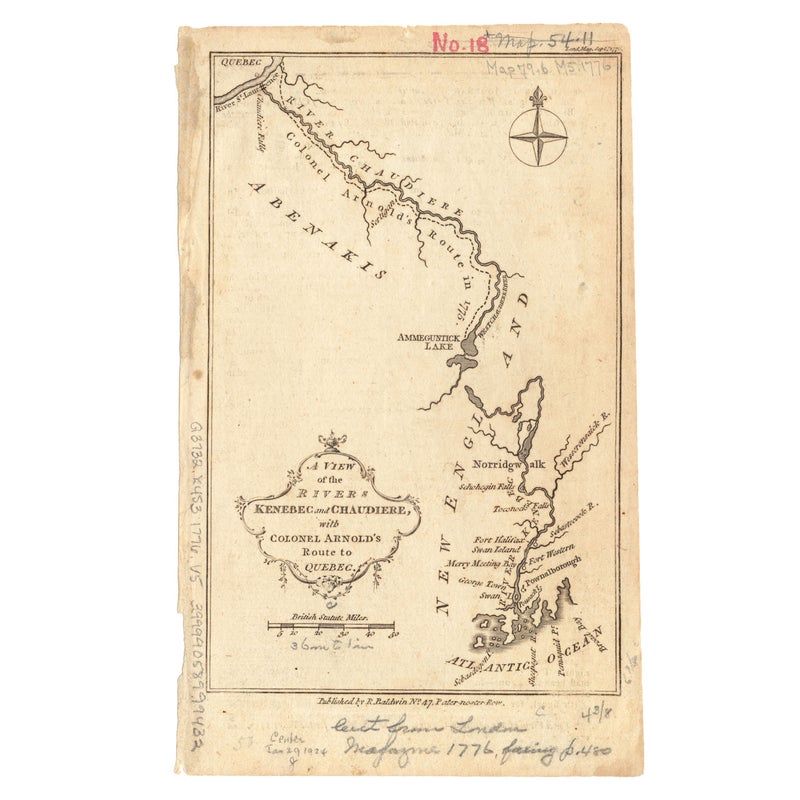
The portage was five days of pain and misery, but it was also simple. Yes, you got covered in bruises. Your muscles and joints ached like the heart of a lovesick teen. Hands turned raw and swollen. But you had one clear mission: keep moving forward. That’s all that mattered. When is life so beautifully simple? Strain. Push. Pull. Lift. Run. Moan. Again and again.
In an October 13 letter to George Washington, Arnold praised his soldiers’ conduct while explaining their slow pace. “We have been obliged to force up against a very rapid stream, where you would have taken the men for amphibious animals, as they were [a] great part of the time under water; add to this the great fatigue in portage, you will think I have pushed the men as fast as could possibly have been. The officers, volunteers and privates have in general acted with the greatest spirit and industry.”
Midafternoon on October 13, we reached Flagstaff Lake. Back in Arnold’s day, the portage trail met the shallow, slow-moving Dead River at this spot. But now, thanks to a massive dam built in 1949, this section is a large, clear body of water surrounded by mountains. Every bit of shorefront was tastefully decorated with driftwood and red foliage.
Despite the late hour, we shoved off from the southeast coastline, mostly protected from a 20-knot southerly wind. But within minutes we were awash in a whitecapping torrent. Water poured into Batty like she was the SS Minnow, so I steered for the leeward side of a nearby peninsula. The shore was studded with big rocks, but it was too late and dangerous to find another spot.
“Guess we won’t be doing much sleeping tonight,” Ben said. Rob had planned to leave us again here, and he immediately tromped through the woods to rendezvous with Allison at a nearby road. Attempting to make the best of our situation, I suggested we try the Ziploc of pecan-pie-flavored martinis that a family had given us during the Great Carry. Maybe the booze would help make things a little less miserable.
The martinis ended up working a bit too well, and we made the unanimous (sort of) decision to cross the thing at night. We folded the tarp into a triangular shape to improve our angle of sail and shoved off after sunset for a moonlit crossing.
The bateau flew through the cresting swell. Ben, constantly attempting to pump the bilge dry, would yell, “I’m pumping. Still pumping!” Every few minutes, I’d have to remind him that the end of the bilge hose actually needed to be overboard, and he’d add, “I’m really drunk!” The wind repeatedly landed the sail in the water. Even so, we covered seven miles by midnight. It was only in the morning light, when we saw how strewn the lake was with tiny rock islands, ledges, and unseen obstacles, that we realized what a miracle it had been.
Now we were on the Dead proper, and the river was initially slow and deep, meaning we could make decent time upstream. Even better, we found Mr. Arnold Trail himself, Kenny Wing. He and his dad, who started the Arnold Expedition Historical Society with friends, had found nearly every Arnold artifact between Flagstaff and the Canadian border: hundreds of musket balls, ax heads, knives, utensils, and clinched bateau nails. Kenny let us camp on his land, hauled our gear, bushwhacked trails, and dragooned volunteers. I can still picture his 89-year-old mother running beside us carrying a log on one of our many portages.
The Dead was the same as it had always been: serpentine and narrow, with endless shallows followed by startling dark depths created by the river’s many industrious beavers. At times it was less than 20 feet across and only a few inches deep. We bashed both ourselves and Batty on the rocky bottom as we pushed and pulled endlessly.
This 30-mile segment made everything that had come before seem like a guided, store-bought adventure. When the sun dropped behind the trees, we felt the cold deep inside our shivering bodies. Our wet clothing would freeze solid during the night, and in the morning we’d pour boiling water into our neoprene boots before we put them on. Our hands swelled and our joints were so abused that they ache now, months later.
Arnold’s men were hit by a hurricane on this stretch. The river rose eight feet, destroying most of the bateaux and their provisions. Almost immediately afterward, some 300 to 450 men (accounts vary), including sick and injured soldiers and an entire division led by Lieutenant Colonel Roger Enos, deserted and turned back for civilization, taking a majority of the expedition’s remaining food supplies. Enos’s division had trailed far behind and, in retrospect, their quitting seems almost inevitable.
We kept going, however, and on our fifth day on the Dead we reached its end, at the Chain of Ponds Dam. Rob was standing on the dam yelling, “I don’t like you guys! You sent all my stuff back!” (This was true. His stuff weighed at least 60 pounds.) But seeing him was good timing, since John would be going home in a couple of days. He had told his wife that he’d be gone a month, and time was up.
Through the 12-mile Chain of Ponds, Kenny led us on portages over unbroken wooded ground that followed Arnold’s route exactly. We even carried Batty right over a spot where Kenny and his dad had discovered a series of nails laid out in the shape of a bateau. Arnold, out in front and already on the banks of the raging Chaudière, had ordered all the bateaux left behind. “The oppression of carrying them was becoming absolutely intolerable,” one soldier wrote. “With inexpressible joy we dropt those grievous burthens.”
We crossed Arnold Pond, the last in the chain, on October 23. The remaining mile to the Canadian border, over the Height of Land, was fairly easy work: Orland Bean had brought a canoe trailer for us to push-pull Batty to the Arnold River, a few miles into Quebec. People stopped. Cheered. One man gave us three cans of Coors.
Arnold and his men had a much rougher time here, on account of groups getting lost, much boggier land, tattered clothing, snow and ice, and starvation. By now the troops had resorted to eating hair grease, shoe leather, candle wicks, and, eventually, the remaining camp dogs.
“They ate every bit of him,” the owner of one reported, “not excepting his entrails.… They collected the bones and carried them to be pounded up, and to make broth for another meal.” But, like us, the party was eventually assisted by friendly Quebecois. Arnold had sped down the Chaudière in a canoe in search of a settlement and finally found one near present-day Saint-Georges. Eighteen Quebecois, sympathetic to the rebel cause and paid by Arnold, delivered five oxen, two horses, two sheep, and eleven barrels of flour to the hungry men.
After slogging through the shallow Arnold River for two days, crossing Lake Mégantic, and then rolling Batty on logs through the town of Lac-Mégantic, we reached the Chaudière, the penultimate leg of our adventure, on October 25. Heavy rains had swollen the river overnight, covering rocks and ledges with just enough milky-brown water to make avoiding them difficult. Ben steered while I took to the bow, and Rob stayed in the middle. It didn’t go well. We’d avoid a shallow boulder, I’d scream, “Looks good now!” and then we’d slam to a halt. The boat would heel to one side, swamp, and then submerge and float free. We’d scramble to an eddy, unload our gear, drain the boat, and head off again.
We were waiting for a break in the rapids to cross to the other side, where we had agreed to meet Wilder after his two weeks away. At some point, Rob yelled over the roar of the water, “What are we doing, Hodding? A half-hour ago you said we’d cross the river and stop, but you still aren’t doing it!” We ferried across right after that, swamping on the way, and made camp in the rain on the side of a hill. There was no level ground, and by this point neither Ben nor Rob was really speaking to me. But at least Wilder found us hours later, in the dark.
Our time on the Chaudière was filled with running rapids, lining the boat past rapid-choked narrows, or paddling in rapidly moving flatwater. The river rose another six feet, and as we sped past rolling hills of farmland, one would have called it bucolic if not for the smothering odor of cattle dung.
Many, many swampings later, on October 31, we left the Chaudière for good, only a few miles from where the Arnold expedition started marching the 25 miles to the Saint Lawrence. We were a week ahead of their pace, after our brisk descent of the Chaudière. Wanting Batty to make the entire trip, and down to only three able-bodied men, we opted to rent a U-Haul to reach Lévis, a town on the south side of the Saint Lawrence, just downstream from Quebec City. Arnold spent almost a week at Point Lévis, then a small community with a mill owner who was sympathetic to the Americans, gathering canoes and waiting for a night that they might slip past British forces.
On the night of November 13, Arnold gave the go-ahead to cross. To transport 500 soldiers, however, they had to make three trips and sneak past two warships. One of the canoes broke apart midstream, and the swamped soldiers had to be dragged, holding onto other canoes, to shore.
This 30-mile segment made everything that had come before seem like a guided, store-bought adventure. When the sun dropped behind the trees, we felt the cold deep inside our shivering bodies.
Arnold had accomplished the impossible simply in reaching the city’s walls. Afterward, Washington wrote to him, “It is not the power of any man to command success, but you have done more—you have deserved it.”
It was Washington’s fondness for Arnold, in fact, that made his eventual betrayal cut so deep—that, plus his outrageous successes after the failed attack. Arnold went on to lay siege to Quebec (forcing the British to divert thousands of soldiers to the Saint Lawrence), whip the British on Lake Champlain, and ensure the American victory at the Battle of Saratoga, which convinced France to side with the colonies. Where he didn’t fare so well was politically. In 1780, feeling (correctly) besmirched by cunning fellow officers and politicians, and under the spell of his Tory wife, he hatched a plan to hand the Hudson River fort of West Point over to the Brits. Due only to a few last-minute mishaps did his plan fail, and he slipped away moments before being caught by Washington himself. Arnold went on to fight for the British and eventually retired to England, somewhat of an outcast. He died of edema in London on June 14, 1801.
Like Arnold, we had to wait in Lévis for clear weather and reinforcements—in our case, John and our families. Wilder occupied himself by making a full-size wool flag like the one New England flew during the revolution, and I bought a five-foot-long toy wooden musket. Forty days after we left Pittston, on November 4, we were at last ready to conquer the city.
The tide, ebbing from the west, was supposed to turn at 1:30 p.m., but by 2:45 the water was still rushing downstream. We were southeast of the city ramparts, but we decided to try to ferry across anyway, spurred on by celebratory shots of rum. We rowed for nearly an hour just to stay in place right by the Lévis ferry terminal, putting our lackluster performance on full display. After the tide finally slackened, we crossed over and tucked into a cove, just below the cliffs that housed the citadel.
We were in Quebec City at last! On shore, we hugged each other and then marched up the citadel’s back steps to raise our flag. Of course, since the steps rose hundreds of feet and we’d had more rum than we should have, we had to pause a time or two. However, before the sun set, we stood proudly on those storied walls in full Benedict Arnold expedition re-creation regalia. We took in our success and then turned around and mooned the Canadian barracks to spur the British (or at least any British-speaking soldiers) to come out and fight. None were brave enough to appear—or, more likely, they didn’t know we were there. Whatever. Unlike Arnold, we had won the day. A bateau had made it to Quebec.
Huzzah, huzzah, huzzah!
Contributing editor W. Hodding Carter (Instagram: ) is the author of ��and other books.
